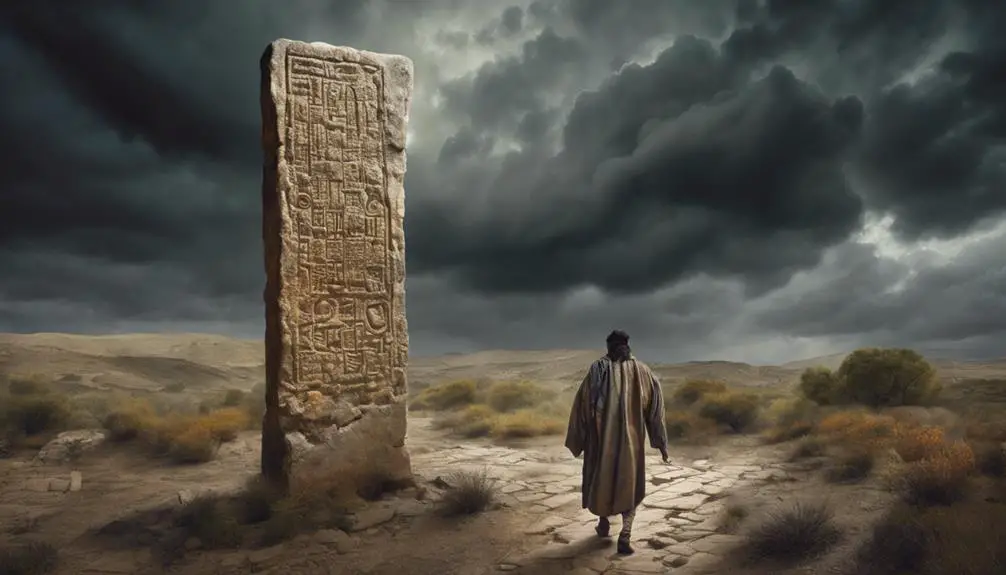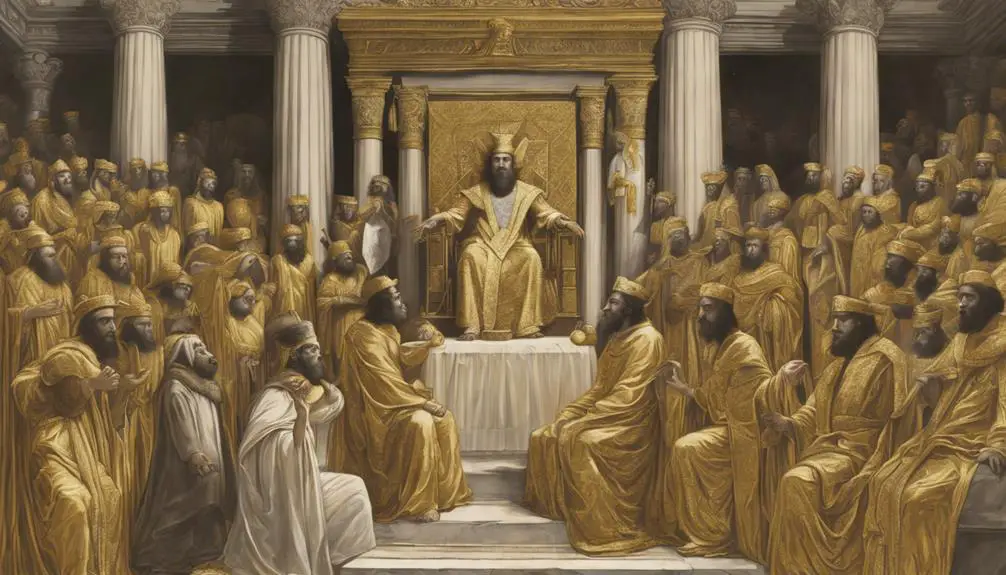Witness the awe-inspiring tales of backsliding in the Bible, a journey of faith, repentance, and redemption that resonates with believers today.

Examples of Backsliding in the Bible
Have you ever pondered the narrative of backsliding in the Bible, the tales of faithful followers who strayed from the righteous path? Consider Adam and Eve's original sin, King Solomon's idolatry, the Israelites' worship of the Golden Calf, Jonah's flight from God, or Peter's denial of Jesus.
These instances, among others, are not just ancient history, but living lessons for today's believers. Intriguing, isn't it?
How can these stories inform your understanding of faith, repentance, and redemption? Let's explore this together, shall we?
Adam and Eve's Original Sin

In examining the concept of backsliding, one can't overlook the original sin of Adam and Eve in the Garden of Eden, a pivotal event that signifies the first human deviation from God's commands. Eden's Temptation presented itself in the form of a serpent, an embodiment of cunning deception. The narrative, deeply entrenched in symbolism, posits that the lure of knowledge and autonomy led to mankind's downfall.
You'll find that Sin's Consequences were swift and severe. God, in His justice, banished Adam and Eve from the idyllic Eden, subjecting them to mortality, labor, and hardship. This original sin, this first act of disobedience, set a precedent for humanity's inherent tendency to backslide – to turn away from God and His decrees.
The implications of this transgression are profound. It introduced sin and death into the world, thus severing the immediate fellowship humanity once enjoyed with the divine. The repercussions echo throughout human history, serving as a stark reminder of the cost of disobedience and the relentless lure of temptation.
In the context of backsliding, Adam and Eve's original sin represents the genesis of mankind's spiritual struggle, a recurring theme throughout biblical and human history.
King Solomon's Idolatry

Turning from the origin of mankind's spiritual struggle, we now delve into the life of King Solomon, a biblical figure whose descent into idolatry serves as a prime example of backsliding. Solomon's spiritual decline commenced when he allowed his foreign wives to introduce him to their gods, forsaking his devotion to Yahweh, the God of Israel.
This spiritual backslide had dire consequences, both personal and national. On a personal level, Solomon's idolatry led to the fracturing of his relationship with God, a relationship that had once been marked by unparalleled wisdom and divine favor. This spiritual estrangement was evident in the silence of God toward Solomon in the latter part of his reign, a stark contrast from the divine interactions of his early years.
On a national level, Solomon's idolatry had Temple Desecration Consequences. The Temple of Solomon, once a sanctified place of worship, was defiled by his idolatrous practices. This desecration led to the eventual division of the kingdom after his death. It's a poignant reminder that spiritual backsliding not only affects the individual but also has far-reaching implications that can alter the course of a nation's history.
Israelites' Golden Calf Worship

Shifting our focus to another significant instance of biblical backsliding, you'll find the story of the Israelites worshipping a golden calf an illuminating example. This occurred during their Exodus from Egypt, while Moses, their leader, ascended Mount Sinai to receive the Ten Commandments from God.
Impatient and fearful due to Moses' prolonged absence, the Israelites persuaded Aaron to facilitate the idol creation. A golden calf was fashioned from their donated jewelry, marking a drastic return to the idolatrous practices they'd supposedly left in Egypt. This was a clear violation of the very commandments Moses was receiving, directly contravening God's directive against idol worship.
The apostasy consequences were grave. On his descent, Moses, confronted with their idolatry, shattered the tablets of the commandments in anger. God's wrath was kindled, resulting in a plague and the death of about 3,000 men. This episode underscores the severity of apostasy and the dangers of impatience and fear guiding actions.
Jonah's Flight From God

Diving deeper into biblical backsliding, we encounter the compelling narrative of Jonah, who famously tried to flee from God's directive. This is the quintessential example of Jonah's Rebellion, where he attempted to escape from his divine mission.
In examining Jonah's flight, we can identify three significant moments:
- Jonah's initial decision to run away
- His encounter with a violent storm at sea
- And his eventual swallowing by a giant fish, which is a clear instance of Divine Intervention.
Each of these moments evidences Jonah's backsliding, his profound struggle with rebellion against God's command. Initially, Jonah chooses to run, exhibiting willful disobedience. The storm at sea signifies the chaos that often ensues when we diverge from God's path. Jonah's swallowing by the fish isn't a punishment, but rather a Divine Intervention, God's merciful act to bring back His wayward servant.
Jonah's flight from God serves as a powerful reminder that rebellion against divine directives doesn't lead to freedom, but rather into deeper troubles. The story underscores the futility of attempting to escape God's purpose for our lives and the redeeming power of Divine Intervention.
Peter's Denial of Jesus

Moving from Jonah's rebellion, we now examine another biblical instance of backsliding in Peter's denial of Jesus, a moment that illuminates the human propensity for fear-driven betrayal. Peter, one of Jesus' most devoted disciples, vehemently denied association with Jesus, not once, but thrice. This denial, driven by fear of persecution, is a profound example of backsliding.
Upon Jesus' arrest, Peter found himself in a position of potential danger. Out of fear for his safety, he disowned Jesus three times. This fulfills Jesus' prophecy, which added a stark layer of premeditated denial. Peter's regret was immediate and intense. The gospel records that upon hearing the rooster crow – a reminder of Jesus' prediction – Peter went out and wept bitterly.
The denial consequences were significant. Peter had to confront his fear, his betrayal, and his guilt. This denial however, didn't mark the end for Peter. His regret led to repentance, and ultimately, to restoration. His journey serves as a powerful lesson about the human capacity for failure, the weight of guilt, but also the power of forgiveness and redemption. It's a reminder that, even in our weakness, transformation is possible.
Conclusion
So, you've journeyed through biblical instances of backsliding, from Adam and Eve's original sin to Peter's denial of Jesus. But what's next? Will you heed the lessons from these stories or will you too fall prey to spiritual regression?
That's the lingering question. It's your move now. Remember, even the greatest in the Bible wavered, but redemption is always within reach. The choice is yours.
Will you remain steadfast in faith or become another example of backsliding?



Sign up